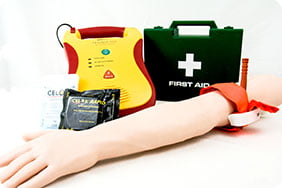Training Focus: Emergency First Aid at Work by Acorn Heath & Safety
The Health and Safety Executive reported in their publication ‘Health and safety at work (Summary of statistics for Great Britain 2017)’ that 137 employees and 92 members of the public were killed as a result of work-connected accidents and an estimated 0.6 million non-fatal injuries to workers in that twelve month period.
Whether the injury or illness is caused by the work they do or not, it is important to give them immediate attention and call an ambulance in serious cases.
First aid can save lives and prevent minor injuries becoming major ones.
The Health and Safety (First-Aid) Regulations 1981 requires the employer to provide adequate and appropriate first-aid equipment, facilities and people employees can be given immediate help if they are injured or taken ill at work.
What is ‘adequate and appropriate’ will depend on the circumstances in the workplace and the results of a ‘first aid needs assessments’.
Our emergency first aid at work training is aimed at those organisations the first aid needs assessment indicates a lower risk environment e.g. offices, shops, libraries etc. where employee numbers are between 25 – 30, or perhaps where a course is needed to complement other first aid provision.
Our Emergency First Aid at Work course programme meets the content requirements outlined in the Regulations and employs a variety of teaching techniques to meet the needs of individual delegates and includes the following:
- Understanding the role of a first aider
- Contents of a first aid kit
- Record keeping
- The unconscious casualty
- Cardiopulmonary resuscitation and the safe use of a defibrillator
- Management of a choking casualty
- External bleeding and shock
- Catastrophic bleeding and the use of tourniquets and haemostatic dressings
- Providing appropriate first aid for minor injuries, including small cuts, grazes, bruises, minor burns, scalds and splinters
Owing to the practical nature of this one day course a basic level of general fitness is required.
Delegates must be physically able to carry out the procedures detailed in the course outline.
Assessment of practical skills is carried out during the course with a multi-choice question paper to confirm theoretical knowledge.
Nigel Braybrooke, Consultant

